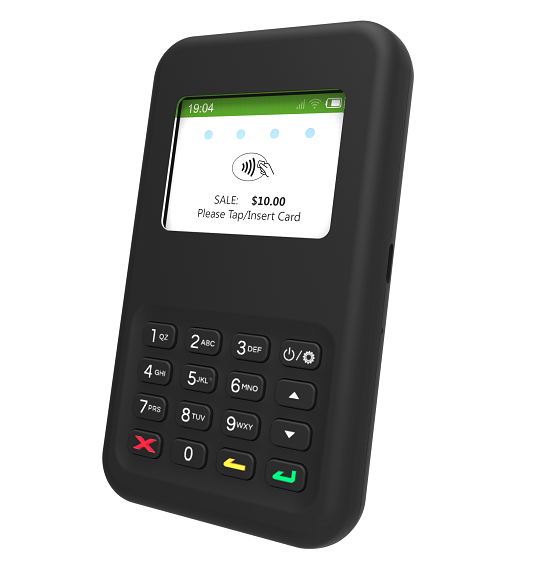The next time you order a glass of wine on a flight, it’s quite likely the card reader you swipe to pay for it was designed by AnywhereCommerce.
Founded in 2006, the mobile point-of-sale (mPOS) provider offers a range of secure devices and innovative software that allows customers to “swipe, dip or tap” to pay for goods and services wherever or whenever they want.
“Mobile payments is an exciting and growing market,” says Michael Kron, president and CEO of the 15-year-old tech company that has sold more than five million card readers alone in 15 countries worldwide.
“We’re known innovators in the payments industry,” adds Kron, a Montreal-based businessman with a history in technology startups dating back to the 1990s.

Michael Kron, president and CEO of AnywhereCommerce
Among the most popular companies he founded was mamma.com, which was dubbed “the mother of all search engines.” It was eventually listed on the Nasdaq Exchange.
“We were a competitor of Google, but Google won,” quips Kron.
A partnership with a group of engineers in Hong Kong lead to the creation of AnywhereCommerce, which now has offices across North America, including Montreal, California, Mexico City, and Atlanta.
Through their intuitive apps, customers can turn their smartphones or tablets into mobile payment devices. These brandable apps make it easy to process credit and debit payments with just a few simple clicks, enhancing the customer experience.
“Whether for small businesses or large enterprises, we enable merchants to offer mobile point-of-sale solutions securely,” says Kron of the fast integration and activation of AnywhereCommerce’s custom solutions, hardware, development tools and connectivity software.
“It’s about adding convenience to your customer’s buying experience and helping you extend your brand and global reach.”

Nomad card reader from AnywhereCommerce
With annual sales of $10 million, their customers and partners range from hair salons, retail and trade show vendors to construction companies, health-care providers and large restaurant chains.
Pandemic fallout
With the COVID-19 lockdowns and stay-at-home orders, airline travel came to a screeching halt in 2020, decimating the revenues of the transportation sector.
“That had a big impact on us because one of our biggest clients is airlines,” says Kron, referring to WestJet, Delta Air Lines and American Airlines.
But when one door closed another sprang open, says the senior executive.
“The pandemic has caused a huge surge in curbside checkout. We’ve made up for lost sales from that trend.”
Despite the unprecedented economic times, he says many businesses, including home delivery services, street vendors, fast food chains and home service providers, like plumbers, roofers and bathroom installers, have been booming. The result: Increased demand for card readers to complete mobile transactions, Kron says.
“Mobile strategy is no longer an option—it’s a critical business success factor. Opportunities are expanding for small businesses wanting to accept card payments and large businesses wanting to increase point-of-sale options to enhance the retail and payment experiences. Both are turning to mobile payments to get closer to their clients.”
You should also check out
Identifying your company’s assets and developing an IP strategy is critical for your overseas expansion.
Ongoing challenges
As a tech company in an ever-evolving industry, AnywhereCommerce’s biggest challenge is protecting their intellectual property (IP), which includes 11 patents, a trademarked brand and vast trade secrets.
Kron says infringement on the company’s IP is a constant concern and requires ongoing monitoring of “new technology that relates to our original patents.”
When it comes to developing innovative technology, “the original concept isn’t the ultimate concept,” he says. “We’re always evolving our software to make it easy for our customers to make payments.”
But safeguarding your patents, creative ideas and software—a company’s “secret sauce”—is a never-ending process, he says.
“It’s easy for someone to copy your patented or copyrighted intellectual property (software and hardware) and sell it as their own,” says Kron, who has several lawsuits pending against companies for patent infringement and theft of trade secrets. In some cases, the damages for lost revenue can reach tens of mllions of dollars. “It’s very hard to stop willful infringers.”
His advice: “File for continuation patents every year to keep your patent family alive.” This type of application strengthens your IP protection by allowing you to turn one patent into multiple patents with each upgrade and improvement you make to your original invention, he says.
For Canadian exporters, Michael Kron offers three tips for protecting intellectual property:
- Hire an IP manager. It’s important to have a dedicated person on your team overseeing your patents, says Kron. “It’s not a lawyer. It’s someone with a bird’s-eye view of the management of your patents who can help you file for them, engage lawyers and assist with due diligence reviews when needed.”
- Divide and conquer. If you’re going to file for patents, keep that part of your business in a separate company from the day-to-day operating company. This adds a layer of protection from litigation.
- Don’t copyright software. Since it’s relatively easy to modify someone’s software and integrate it into their own systems, Kron isn’t a fan of copyrighting software. When you do, all of the details of your software, including your source code, become public, effectively laying out years of development for anyone to steal, he says.
How EDC helped
AnywhereCommerce turned to Export Development Canada for credit insurance to insure a majority of their foreign receivables.
“EDC allows me to offer credit terms to foreign customers in order to stay competitive. Our customers are solid, but a small company can’t risk serious six-figure losses,” says Kron. “Adding insurance is good corporate governance.
EDC’s Export Guarantee Program (EGP) also help the tech company access much-needed working capital to expand their business.
“EDC guaranteed a term loan from our bank, which allowed us to grow further using low interest-debt.”
Michael Kron shares his IP insights on our April 22 webinar, IP strategies: How to protect your intellectual property.






